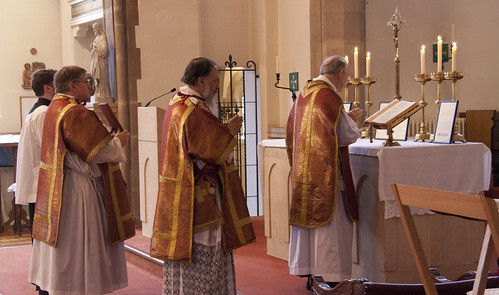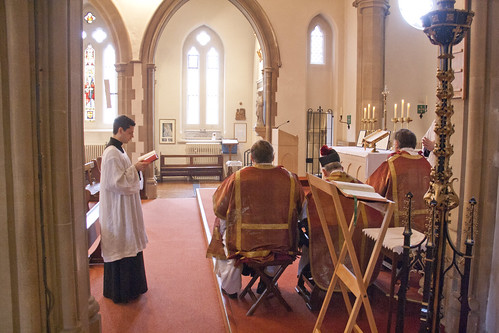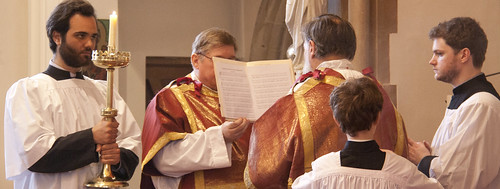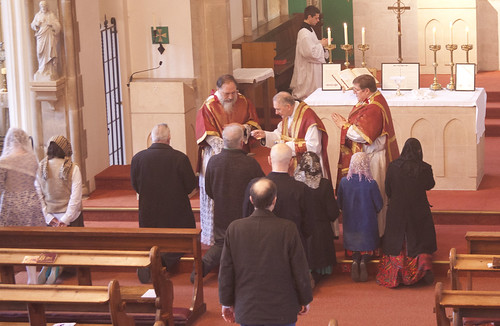As Linda Woodhead explains, in her Introduction to a collection of articles, the secularisation story no longer works. It only ever worked if you ignored the contrary evidence - such as the big revival of religious practice which started pretty well as soon as Arnold's lacrimose effusion came off the presses, and another even more impressive one in the 1950s - but now it is obvious that things simply aren't travelling in the right direction.
Woodhead explains how sociologists' faith in the secularisation hypothesis was shaken first by the Salman Rushdie affair. Rushdie's book
The Satanic Verses was condemned by the Ayatollah Khomeini, who issued a 'fatwa' (ruling) against Rushdie, ordering that he be killed. This was in 1989. It made the sociologists realise that religion, or at least Islam, was actually stronger, in its ability to shape events, even in the West, than it had been before: it wasn't fading away in obedience to the Secularisation Thesis. And then, 22 years later, there was 9/11
If Western sociologists had been paying attention, they would have noticed the revival of Islamic practice and zeal with started in Egypt in the 1970s, and was continued by the Islamic Revolution in Iran in 1979, and has continued some more in the overthrow of a whole heap of secular-minded regimes across the Arab world in recent years. To give them due credit, however, sociologists like Woodhead have been more on the ball than Western politicians, who appear to have clung to the Secularisation Thesis right up to the last few months. I suspect many of have not abandoned it yet. The idea that all the Middle East needs is prosperity and education, and religious zealotry will dissipate, is still rattling around in the corridors of power. Do these people read the newspapers? Syria was a prosperous nation with a big, educated middle class. They've got money coming out of their ears in the Gulf. There are universities of international standard in Egypt. And guess what? It was as those universities that the Islamic revival began. It was there, not in the slums, where young women started to wear head scarves.
In truth, the Secularisation Thesis was kept on its shakey legs after the War not by the inevitable effects of education and prosperity, but by the Cold War. It was the resources poured into Communist and anti-Communist factions, by East and West, which made the world outside North America and Western Europe look as if it was focused on secular issues. Once that was out of the way, an awful lot of people have turned to traditional religious themes to assert their identity and culture and distinguish themselves from their colonial past. We are now living in a period in which radicalised Hindus are persecuting Muslims in India, radicalised Buddhists are persecuting Muslims in Burma and Sri Lanka, radicalised Sunni Muslims are persecuting Shia Muslims in Iraq, and Christians are being persecuted by pretty well everyone. It's not a pretty sight, but it's not secularisation.
Is victory for the homosexual lobby and 'reproductive rights' feminists at the United Nations around the corner? You've got to be joking. I follow the excellent
Friday Fax, which covers the infinitely depressing machinations of the World Government in Waiting. The progressive lobby's breakthrough is always round the corner. They've got the western nations in their pockets, they have the procedures taped, they like to see aid money being used to buy votes. But things are not going their way. A horrible realisation should begin to dawn on them some time soon. We have a world-wide revival of traditional values on our hands.
To repeat, this has actually been going on at least since the early 1970s. And it is not just Islam. Even Christianity is benefitting: the Catholics of southern India and West Africa, pressure from Hindus and Muslims notwithstanding, have had a very good few decades, and the very visible presence of their priests in the West has more to do with the massive numbers of vocations they have than persecution. In China, too, Christianity is on the march, as the most vigorous alternative to Communism.
There is nothing inevitable about secularisation. The sociologists have now accepted this, and the politicians, eventually, will follow them. This reality will solve some problems, such as the prospect of a right to abortion being established in international law by some international mega-treaty, but obviously creates others. The punch-line of this blog post is simply this: in addressing the problems, which are very real and very pressing, let's not try to pretend that the Secularisation Thesis is true after all. And part of that pretence is the guff about Religious Freedom.
I've argued more than once that appeals to Religious Freedom, to defend the Church against militant secularists in the West, is a complete waste of time. It is even more of a waste of time when directed against non-Christian religious zealots. This is so blindingly obvious that it shouldn't need saying, but I am saying it because I can see the temptation to make this appeal in a recent speech by Lord (David) Alton. I'll address this in the next post.
Support the work of the LMS by becoming an '
Anniversary Supporter'.
















